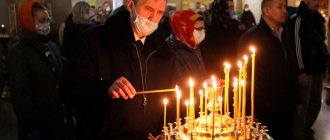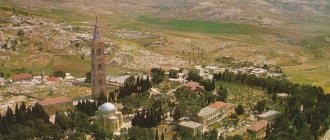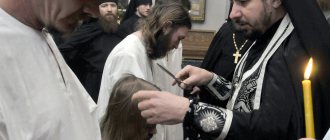Monastery
See also our website “Pilgrim’s ABC”
Monastery (from the Greek μοναστήριον (monastirion) - solitary dwelling) - 1) place of residence and ascetic activity of monastics, united by brotherly love in Christ, subject to the requirements of a single charter; 2) a community of monks (nuns) of a monastic monastery.
As a community, the monastery has its own internal structure. The main officials of the monastery include the abbot, treasurer, confessor, dean, sacristan, and housekeeper. Officials of the monastery are also the regent, the ecclesiarch (senior sexton), the candle maker, the shopkeeper, the sexton, the bell ringer, the clerk, the librarian, the steward, the prosphora keeper, the refector, the innkeeper, and the sick man.
Following the 43rd rule of the VI Ecumenical Council, no previous moral way of life prevents a Christian from leaving the world and entering monasticism for the sake of correction and salvation of the soul. Anyone who enters the monastery becomes a novice and undergoes a test. If after the test he turns out to be worthy, he is tonsured into the monastic rank. The highest rank of monastic life is the great schema.
Monasteries are divided into male and female. Particularly large monasteries are usually called laurels. The first monasteries appeared in the 4th century. in Egypt and Palestine. Kiev-Pechersk Monastery is the first monastery in Rus' (XI century).
***
From the Charter of the Holy Trinity Tyumen Monastery:
“An Orthodox monastery is a Christian community that strictly lives according to the commandments of God, seeking spiritual perfection in the deeds of Christian life.
The basis of the monastic spirit are the words of the Lord Jesus Christ Himself: “If you want to be perfect, go, sell what you have and give to the poor, and you will have treasure in heaven, and come and follow Me” (Matthew 19:21) laid down in the basis of the vow of non-covetousness.
He who makes a vow of obedience and renunciation of his will and his wisdom must base it on the word of the Lord: “If anyone wants to come after Me, let him deny himself, and take up his cross and follow Me” (Matthew 16:24). One who takes a vow of chastity must heed the word of Christ: “Whoever is able to receive it, let him receive it” (Matthew 19:21) and the word of the Apostle: “He who is unmarried is concerned about the things of the Lord, how to please the Lord” (1 Cop. 7:32).
We must encourage ourselves to faithfully and unremittingly fulfill these vows with the word of Christ: “No one who puts his hand to the plow and looks back is fit for the kingdom of God” (Luke 9:62). About the beneficialness of obedience, about the need for spiritual guidance, about the dangerous desire to live according to one’s own will, one should admonish oneself with the words of the wise Solomon: “For lack of care a people perishes, but with many advisers they prosper” (Prov. 11:14).
Monastic life must be well-ordered on the unshakable foundation of the Word of God, with the assistance of the instructions and examples of the Holy Fathers. Saint Basil the Great, in one of his conversations, gives a detailed description of monastic life: “A monk,” he says, “must, first of all, acquire a non-covetous life, physical solitude, decent appearance, have a moderate voice and modest speech, food and drink that does not cause rebellion , there is in silence; to remain silent before elders, to listen to the wise, to have love for equals, to give loving advice to inferiors; avoid worthless, carnal and vain people, think more and speak less, do not be impudent in words, do not allow excesses in conversation, avoid laughter, adorn yourself with modesty, lower your gaze and lift up your soul to grief, do not respond to contradiction with contradiction, be submissive ; work with your own hands, always remember death, rejoice with hope, endure sorrow, pray unceasingly, give thanks for everything, be humble in front of everyone, hate arrogance; be sober and guard your heart from evil thoughts..., take care of the suffering, cry with them..., admonish the disorderly, console the faint-hearted, serve the sick..., take care... of brotherly love.”
A monk must more fully and completely strive to embody in his life one of the most important commandments of Christ - the commandment of love: “Love the Lord your God with all your heart and with all your soul and with all your mind; ...and love your neighbor as yourself” (Matthew 22:37–39). The monk creates love for God through unceasing prayers, talking with Him, confessing to Him his weaknesses, sins and glorifying His goodness and mercy in everything. A monk develops love for his neighbors in patience with their shortcomings, in constant prayer for them, in various types of help and mercy towards them.
True workers of God, who keep the name of God in honor, carry It in their hearts as the greatest shrine, feed on it, enjoy it, and in this Name they have a guarantee of future bliss. The name of Jesus Christ contains everything: our Orthodox faith, and all church services, every rite, its ritual and order, and all prayerful follow-up - and every Christian, when praying, is obliged to unfailingly offer his prayer to the One Son of God, Who is the One Intercessor before God for men (1 Tim. 2:5), and only to Him and through Him is our prayer effective. He Himself commanded, saying: “Whatever you ask from the Father in My Name, I will do it” (John 16:23–24).
The Lord Jesus Christ contains the entire universe, and all creation, visible and invisible, and every breath, and especially brings joy to those who bear this most precious Name within their hearts. If we were to remove the name of Jesus Christ from ourselves, then everything would disappear: the Orthodox faith, the Church, and Divine services, all the Sacraments and rituals, all spiritual service and the Gospel itself. This is what we need to understand about a person: if Jesus Christ does not live in him by His grace-filled power, then there is nothing spiritual there - here only spiritual and physical life moves, according to the elements of this age, because the root and boundless fullness of spiritual life is Jesus Christ, Whom you need to love more than your soul, and with all your might, throughout your life, try to install His most dear name in your heart and so that it is a root, active principle there and occupies a dominant position, so that, according to the word of the Apostle, , “we did not live, but Christ lived in us” (Gal. 2:20). From the sincere union of the heart with the Lord, when the Lord Jesus Christ makes His abode in us, tangibly and effectively dwells in the heart, and His Divine presence is heard clearly and tangibly, which is called, according to the Holy Fathers, living communion with God. And then Christ God, being our Redeemer and Savior, descends into man with His Divine powers, also to life and godliness (2 Peter 1:3) and, as it were, creates a permanent abode for Himself in him (John 14:23), so that man becomes the temple of the Spirit of God (1 Cor. 6:17), the church of the Living God (2 Cor. 6:16). The Spirit is one with the Lord (1 Cor. 6:17). There is a God of Love. Abiding in Love abides in God, and God abides in him (1 John 4:16); and the hedgehog lives - God lives (Rom. 6:10) and does not live for himself, but God lives in him (Gal. 2:20).
Christ is then in man, even as he wills and does (Phil. 2:13). A person enters this spiritual state, if we understand the ordinary order of affairs, not suddenly, but mentally at the end of his spiritual exploits and labors. It is the goal of the aspirations of every rationally living monk. Having achieved this, he: enters freedom and rests in God, carries in his heart the source of life - the Lord God Himself - and this is the undoubted hope of eternal salvation. (Schimonk Hilarion: “On the Caucasus Mountains”).
While the monks were only single, the so-called anchorites, they were each saved according to the rules given to them by their fathers and their mentors, but with the advent of monasteries and a large brotherhood, a Charter was required that could regulate monastic life in them and contribute to a better development of the monastic spirit. The Monk Pachomius the Great, an ascetic of the 4th century, received such a cenobitic Rule from the Holy Angel, and it formed the basis of all other monastic Rules: St. Anthony the Great, St. Basil the Great, Savva the Sanctified and the Venerable Theodore the Studite (his Rule was subsequently adopted by the Monk Theodosius for the Kiev-Pechersk Monastery and later became a model for all other Russian monasteries).”
***
See monastery, monasticism, monastic vows, treasurer, dean, sacristan, housekeeper, confessor, novice, obedience, novitiate, cenobite, anchorite, lavra, schemamonk, elder, cell
Forms of monastic residence
Since the 4th century, there have been two main forms of monastic life: hermitage (anchorite, hermit-dwelling), monastic life (keliotism) and community life .
Hermitage
Hermitage is a form of individual monastic achievement. Its founders are Reverends Paul of Thebes and Anthony the Great. Not all monks are capable of hermitism in the strict sense of the word. The decision to leave the monastic hostel and begin the exploits of hermitage cannot be made hastily and willfully without the blessing of the abbot.
Skete life
Skete life is a form of organization of monastic life in which monks have individual, usually separately located cells and each perform a special monastic rule, gathering together only for divine services. The founder of the skete life is the Monk Macarius the Great.
Dormitory
A hostel is a way of organizing the life of a monastic community, in which monks have common services, a common daily routine, a common meal, and common property. The founder of the hostel is St. Pachomius the Great.
In the dictionary D.N. Ushakova
MONASTERY, monastery, man. (·Greek: Monasterion). 1. Land-church organization, which is a community of monks or nuns. Monasteries are an instrument of political oppression and exploitation of the masses. Monastery. Convent. Leave (enter) a monastery. | collected Members of this community. The whole monastery gathered. 2. Church and residential premises belonging to this community. “Our monastery sparkled with a battlement.” Lermontov. “Sit in a room all day, as if in a monastery.” Chekhov.
Reports
Bishop of Tuapse Dionysius
Elder, abbot and father: spiritual and moral character and life feat of Archimandrite Abel (Makedonov)
/International Conference “Monasticism in Russia and Cyprus: Spiritual and Cultural Connections”
Bishop of Lidra Epiphanius
The relationship of a monk with the abbot and brethren in a modern monastery - topical issues
/International Conference “Monasticism in Russia and Cyprus: Spiritual and Cultural Connections”
Metropolitan Athanasius of Limassol
The main stages of the spiritual path of a monk. Main difficulties and obstacles. The role of the abbot as a spiritual leader
/International Conference “Monasticism in Russia and Cyprus: Spiritual and Cultural Connections”
Archimandrite Melchizedek (Artyukhin)
Spiritual and moral character and service of elders in Russia in the 20th century
/International Conference “Monasticism in Russia and Cyprus: Spiritual and Cultural Connections”
Metropolitan Isaiah of Tamassos and Orinia
Hegumen of the Monastery of the Apostle Barnabas, Archimandrite Gabriel Siokouros (1923–2013): the holy face of Cypriot monasticism
/International Conference “Monasticism in Russia and Cyprus: Spiritual and Cultural Connections”
Archimandrite Dionysius (Koptidis)
The abbess of the sacred monastery of the Hieromartyr Iraklidia, Abbess Charithea as an example of modern spiritual life among female monasticism in Cyprus
/International Conference “Monasticism in Russia and Cyprus: Spiritual and Cultural Connections”
Bishop of Tuapse Dionysius
Elder, abbot and father: spiritual and moral character and life feat of Archimandrite Abel (Makedonov)
/International Conference “Monasticism in Russia and Cyprus: Spiritual and Cultural Connections”
Bishop of Lidra Epiphanius
The relationship of a monk with the abbot and brethren in a modern monastery - topical issues
/International Conference “Monasticism in Russia and Cyprus: Spiritual and Cultural Connections”
Metropolitan Athanasius of Limassol
The main stages of the spiritual path of a monk. Main difficulties and obstacles. The role of the abbot as a spiritual leader
/International Conference “Monasticism in Russia and Cyprus: Spiritual and Cultural Connections”
Archimandrite Melchizedek (Artyukhin)
Spiritual and moral character and service of elders in Russia in the 20th century
/International Conference “Monasticism in Russia and Cyprus: Spiritual and Cultural Connections”
Metropolitan Isaiah of Tamassos and Orinia
Hegumen of the Monastery of the Apostle Barnabas, Archimandrite Gabriel Siokouros (1923–2013): the holy face of Cypriot monasticism
/International Conference “Monasticism in Russia and Cyprus: Spiritual and Cultural Connections”
Archimandrite Dionysius (Koptidis)
The abbess of the sacred monastery of the Hieromartyr Iraklidia, Abbess Charithea as an example of modern spiritual life among female monasticism in Cyprus
/International Conference “Monasticism in Russia and Cyprus: Spiritual and Cultural Connections”
Number of monastics in 1825-1914*
| Year | Monks | Novices | Nuns | Novices | Total |
| 1825 | 3727 | 2015 | 1882 | 3456 | 11080 |
| 1840 | 5122 | 3259 | 2287 | 4583 | 15251 |
| 1850 | 4978 | 5019 | 2303 | 6230 | 18530 |
| 1860 | 5648 | 5554 | 2931 | 7669 | 21802 |
| 1870 | 5750 | 5710 | 3226 | 11412 | 26098 |
| 1880 | 6481 | 2902 | 4759 | 14071 | 28213 |
| 1890 | 7189 | 5523 | 7306 | 20268 | 40286 |
| 1900 | 8578 | 8090 | 10082 | 31533 | 58283 |
| 1914 | 11845 | 9485 | 17283 | 56016 |
[] RIO. St. Petersburg, 1902. T. 113, book. 1; Preobrazhensky I. The Fatherland Church according to statistical data from 1840/41 to 1890/91. St. Petersburg, 1901; The most humble report of the Chief Prosecutor of the Holy Synod K. Pobedonostsev for the Department of Orthodox Confession for 1900. St. Petersburg, 1903. Appendix; The most humble report of the Chief Prosecutor of the Holy Synod for the Department of Orthodox Confession for 1914. Pg., 1916.











